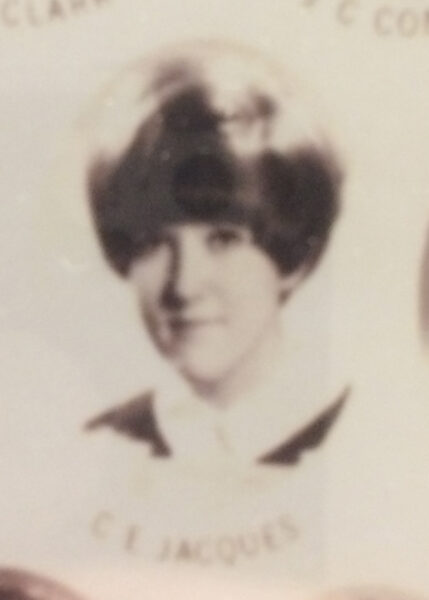
Clare E. Jacques-Shields
Retired nurse
Graduation year: 1967
Hometown: Ottawa
Current town: Toronto
Tell us about your career as a nurse
When I graduated from the nursing program at the University of Toronto, I worked at the Queen Street Mental Health Centre (now Centre for Addiction & Mental Health). I also worked in a dental office and eventually, began working at Bloorview Kids Rehabilitation Hospital. I worked there for 20 years.
While there, I did my Masters in Adult Education at the University of Toronto. Some of my colleagues at Bloorview participated in my research study for my thesis, which was on the career lifespan development of nurses. Most of the nurses I interviewed had gone through a 3-year education program. They had the experience of living in residence, which was what nursing students did in our era, and was a very bonding experience for students.
I also taught nursing students at Seneca College and York University. At Seneca College, I taught skills labs. At that time we had a full semester course on communication which was really invaluable to the students. In the first couple days of class, you could often hear the students grumbling, “I can’t imagine why we need this, we already know how to communicate!” But within a couple of weeks of understanding the value of the course, the students appreciated it.
After graduating and being away from the field for some years, and after the loss of my husband, I started a program at the Faculty of Nursing at the University of Toronto on the topic of wellness for nurses. It was a program that was intended to help students learn how to deal with the professional stresses; learning how to communicate with family members; how to deal with grief; and how to work well alongside other health care professionals. At the time, it was called the Clare Shields Wellness Program.
My husband was a doctor and he worked up north in Sudbury. I started a program within the medical school up there that helped teach medical students how to take better care of themselves so they could take better care of their patients. These programs – teaching medical professionals like nurses how to engage in self-care – are so valuable. It is important for a graduate to understand the emotional side of the situations they will find themselves in throughout their professional lives. We do such a good job referring patients and their families to support but sometimes we don’t know how to do it for ourselves and colleagues.
I’ve learned since I retired that once you are a nurse, you never stop nursing. People are always coming to me seeking advice about health-related matters.
Once a nurse, always a nurse.
Tell us about your time as a nursing student
As a nursing student at the University of Toronto, we had placements in 9 hospitals throughout the city. I can recall a ‘hierarchy’ of elevator usage. The doctors got first dibs on the elevator, then nursing supervisors, then floor nurses, then medical students and then finally nursing students. One particular day, it was the nursing students who got on an elevator last, but somehow arrived on our floor first. We had a good laugh over that.
At times in the hospitals, students were looked down upon; we were still learning. And in addition to learning how to care for patients, we were also learning how to work well with health care professionals who may not have seen us in the most positive light. Those experiences taught us how to get along well with people of different backgrounds and varying levels of education. It was important to remember that no matter what our labels were, we were all looking after the same patients and wanted to give them the best care we could.
Why did you want to become a nurse?
I was always interested in helping people. My mother wanted to be a nurse but she never did; my father wanted to become a doctor but couldn’t afford it.
During my schooling years in the 1960s, women had two options: become a teacher or a nurse. My grandmother wanted me to become an architect. I chose nursing and made a career out of it.
What advice do you have for current nursing students?
I want students to look at the lifespan of their career while they’re still in the undergraduate program. Map out where you want to be 5 years from now. Ask yourself, “What am I really interested in and how am I going to get there?”
Favourite quote:
There are only two ways in which to live your life; as if nothing is a miracle and the other as if everything is.” – Einstein
I love that so much that it is engraved on my late husband’s headstone. When I was doing my Masters, my husband called me “Einstein” because I always had my nose in a book.